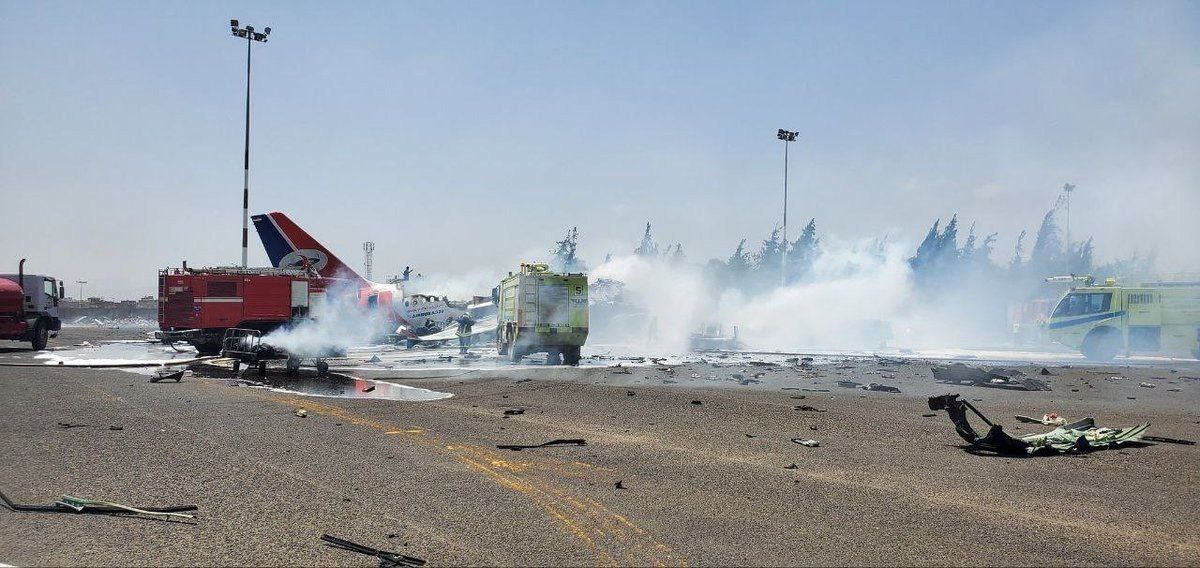Israeli Air Force aircraft conducted a fresh strike on Sanaa International Airport in Yemen’s capital Wednesday morning, marking the second attack on the aviation facility in less than two weeks as part of the ongoing military campaign dubbed Operation “Golden Jewelry”. The strike comes amid escalating tensions between Israel and Houthi rebels, with alert sirens sounding almost daily across Israel due to projectile fire from Yemen.
Israeli Defense Minister Israel Katz confirmed the operation and announced that the Air Force had destroyed the last remaining aircraft in Houthi possession. “Air Force aircraft have now struck terrorist targets of the Houthi terrorist organization at Sanaa airport and destroyed the last remaining aircraft in Houthi use as part of Operation Golden Jewelry”, Katz stated in an official announcement. He characterized the action as “a clear message and direct continuation of the policy we have established: whoever fires at the State of Israel will pay heavy prices”.
The Defense Minister outlined an expansion of Israeli military operations against Houthi-controlled infrastructure. “Yemen’s ports will continue to be severely damaged, and Sanaa airport will be destroyed again and again, as will other strategic infrastructures in the region serving the Houthi terrorist organization and its supporters”, Katz declared. He further announced that “the Houthi terrorist organization will be under maritime and air blockade – as we committed and warned. Whoever harms us will be harmed sevenfold”.
Prime Minister Benjamin Netanyahu addressed the strike directly, emphasizing Israel’s retaliatory approach. “The Air Force has now struck again at Sanaa airport, controlled by the Houthi terrorist regime in Yemen. We operate according to a simple principle: whoever harms us – we will harm them. Whoever doesn’t understand this with force – will understand it with even more force”, Netanyahu stated. The Prime Minister directed responsibility toward Iran, saying, “As I have said many times – the Houthis are just the symptom. The main force behind them is Iran, and it is responsible for the aggression emanating from Yemen”.
The Israel Defense Forces issued a detailed statement explaining the rationale behind the strike. “The IDF struck a short time ago at the central airport in Sanaa and aircraft of the Houthi terrorist organization. The aircraft that were attacked served the Houthi terrorist regime for transporting terrorists who promoted terrorist activities against the State of Israel”, the military spokesperson announced. The IDF characterized Sanaa’s central airport as routinely operated by the Houthi regime for what it termed terrorist purposes, drawing parallels to the Hodeidah and Al-Salif ports that were targeted the previous week.
Israeli military officials accused the Houthis of exploiting civilian infrastructure for military operations. “This is another example of the cruel use the Houthi terrorist organization makes of civilian infrastructure for terrorist activities”, the IDF statement read. The military emphasized its determination to continue operations, declaring that “the IDF is determined to continue operating and striking forcefully against anyone who poses a threat to the residents of the State of Israel, at any distance required”.
The current strike follows Operation “Red Sunsets”, executed approximately ten days earlier, during which Israeli aircraft targeted the Hodeidah and Al-Salif seaports in Yemen. That operation involved 15 aircraft dropping 35 munitions on both ports, which are under Houthi control. According to IDF assessments, these ports serve for transferring combat equipment and represent what the military describes as cynical exploitation of civilian infrastructure for terrorist activities.
The IDF characterized the port strikes as responses to Houthi aggression, stating they were designed to “deepen the damage to the Houthis’ terrorist capabilities”. The Israeli military emphasized that strikes were conducted “after many preliminary warnings by the IDF to minimize possible harm to the civilian population in the area of these sites, and prevention of any hostile activity from the ports will continue”.
Israeli military assessments indicate that the Houthi organization has been operating aggressively for the past year and a half under Iranian direction and funding, aiming to harm Israel and its allies while undermining regional stability and disrupting global shipping freedom. In response to what it characterizes as terrorist use of maritime infrastructure, the IDF issued warnings for civilians to evacuate port areas, stating, “In light of the use the Houthi terrorist regime makes of these ports for terrorist purposes, the IDF again warns those staying at the ports to distance themselves and evacuate the area”.
The intensification of hostilities between Israel and the Houthi rebels has accelerated in recent weeks, with Yemeni insurgents increasing the frequency of projectile launches toward Israeli territory. The near-daily activation of alert sirens across Israel has prompted what Israeli officials describe as a decisive military response, manifested through repeated strikes on various target facilities throughout Yemen. Israeli leadership presents these operations as expressions of its retaliation policy against threats to territorial sovereignty, while consistently emphasizing Iranian support and funding for Houthi activities.
The Israeli military campaign in Yemen represents part of a broader regional escalation, as Israel conducts operations against what it characterizes as an Iranian-supported network of hostile forces. The strikes form part of Israel’s strategy to counter what it views as coordinated aggression from Iranian proxy organizations across the region. However, the continued Houthi launches despite repeated Israeli strikes raise questions about the operational effectiveness of the military campaign in achieving its stated objectives of deterring future attacks.
Operation “Golden Jewelry” exemplifies Israel’s current approach to responding to Houthi attacks, combining targeted infrastructure strikes with public declarations of escalatory intent. The operation reflects Israel’s broader strategic posture of direct retaliation against groups it identifies as threats, regardless of geographic distance. Yet the persistence of Houthi projectile launches following previous Israeli strikes suggests that achieving long-term deterrence against the Yemeni rebels remains an ongoing challenge.
The regional implications of the Israel-Houthi confrontation extend beyond bilateral hostilities, as the conflict intersects with broader patterns of instability affecting international shipping lanes and regional security architecture. The escalating cycle of attacks and retaliation continues to develop against the backdrop of wider Middle Eastern tensions, with both sides demonstrating apparent commitment to continued military action.



